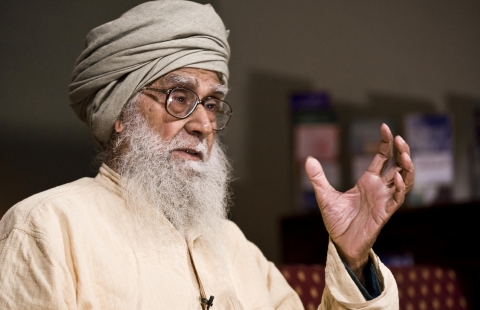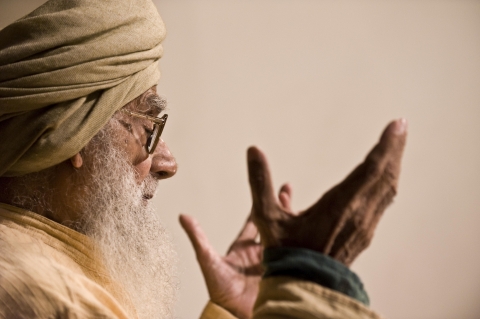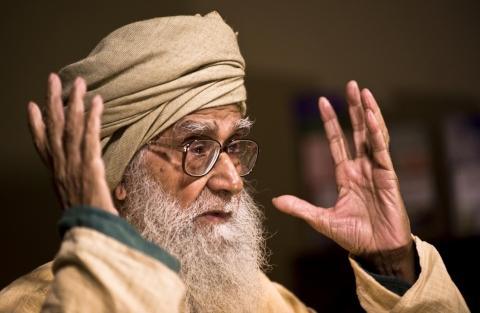Accepting "political status quo-ism."
The correct attitude towards politics in Islam is "political status quo-ism," which is the result of the greatest wisdom. The latter, Khan associates with "the method of political confrontation," meaning that all your time and energy will be spent fighting your rivals instead of achieving something of your own. Instead, Khan thinks that Islam teaches that: "Politics is not the only important field of human activity. There are many other vital spheres of work, like education, business, industry, social reform, academic learning, scientific research etc." Hence, the principle of "political status quo-ism" means the opposite to a politics of change, or at least radical change or revolution. Another principle is the avoidance of "political movements" and, instead, a pragmatic focus on education, science, and business.
His political status quo-ism can be analyzed in relation to the national and international debate situation and the political and social situation in India. Khan…

Arguments Against Suicide Bombings
Khan denounced martyrdom operations as, according to Islam, people can become martyrs, but they cannot court a martyr's death deliberately. He supports his own position on the debate with Sura Al-Anfal. In Khan's commentary, he elaborates that the Surah only shows the responsibility to prepare military deterrent defenses as a "demonstration of force." In Khan's words, "the verse offers us a peaceful strategy to counter the enemy." For this reason, he thinks that the Surah only means building a strong defense to deter warfare and attacks.
Thus, at one stroke, Khan formulate two different ideas. One is a type of constraining military theory of defense in Islam, and the other involves opposition to suicide bombing in Islam. Regarding the first idea, the building of a powerful state army is not only important for maintaining peace; it is an Islamic injunction of correct policy to avoid war by preparing defenses. Regarding the second idea, Khan also directly refutes the usage of…
Clone of MAARIFAH GOD-REALIZATION
Example of Germany and Japan
In his article ‘Lessons From History’, Khan argues that the rise of Japan and Germany after World War II tells us that the power of peace is greater than the power of war. Khan writes that Japan and Germany participated in World War II (1939 – 1945) with parallel ambitions i.e. of becoming number one countries in Asia and Europe, respectively. However, in the course of six years both Germany and Japan were forced to sacrifice numerous lives and resources with widespread devastation. However at the end of the war, Khan writes that leaders arose in both these countries, “who in their wisdom, saved their people from becoming victims of negative thinking.”
Khan quotes Japanese Emperor Hirohito’s radio address to the people on August 15, 1945, after the country’s defeat:
“It is according to the dictates of time and fate that we have resolved to pave the way for a grand peace for all the generations to come by enduring the unendurable and suffering what is insufferable.”…
Existence of God
In his article ‘Does God Exist’ Khan explains why he believes in the existence of God. Here is what he says:
People generally believe that they are in a position to prove or disprove anything. But this is not the scientific position. According to modern science, you cannot prove or disprove anything; you can only arrive at a probability, rather than a certainty.
If there is sufficient data to show that this or that thing probably exists, then one can make the statement that this or that thing exists. The present question of whether God exists itself raises another question. Studies in anthropology, that is, the science of man, have established that the concept of God is ingrained in human nature. Belief in God runs in our blood. Every man and woman is a born believer. Especially in times of helplessness and in crisis, we discover that there is a Supreme Being. Every man and woman has experienced this natural fact at least once in his or her life.
Then why this…
God Calls to the Home of Peace
And God calls to the Home of Peace.’ (10:25) is a verse from the Quran which Khan quotes to explain the future course for Muslims. Khan writes that in this verse ‘home of peace’ means Paradise, Paradise being the place of ideal peace. God Almighty calls to all mankind: ‘If you are desirous of entry into eternal Paradise, you shall have to adopt the culture of peace. You shall have to develop your personality along peaceful lines’, writes Khan.
In his article, titled on this Quranic verse, ‘God Calls to the Home of Peace, Khan acknowledges that Prophet Mohammad did fight battles but adds that all of these were fought in self-defence.
Khan quoting a hadith says that when an angel asked Mohammad if he wanted to be a king-prophet or ‘messenger-prophet, Mohammad chose the latter. Khan writes that this tradition tells us about the thinking of the Prophet. His mind was not political, but only prophetic. His concern was not to establish his rule in the world but to convey to…
Hudaybiya Model: Peace, Not Justice
In his book The Prophet of Peace, Khan writes that the greatest fallacy entertained by people of a militant cast of minds is that they think true peace is accompanied by justice. Khan objects to the mentality of “peace without justice is no peace at all.”
Khan says that such people ought, but seem not to know, that in this world, peace is simply a state in which the disturbances of warfare and social unrest are mercifully absent but in which there is no sure guarantee of justice. “They should understand that, primarily, what the establishment of peace does is open up opportunities for the kind of constructive work to be carried out which can seldom be accomplished in a situation where there is the continual dislocation caused by clash and confrontation. A major part of that construction work is putting in place a system of justice. For it must be borne in mind that justice is not a direct result of peace. It is only by availing of the opportunities offered by the peace that…

Islam an ideology of peace
In his book The Ideology of Peace, Khan writes that history abounds preachers of peace. He says that in centuries no revolution in the true sense of the word has been brought about based on peace. For peace, the human need is not enough to make him exercise restraint and remain peaceable. He needs an ideology that convinces him at the conscious level of the necessity to keep the peace at all times.
Khan writes that in modern times, peace has become so vital to the survival of mankind that it has now literally become a matter of life and death for humanity. Peace means life: its absence means death. He aims to present peace in the form of a complete ideology that awakens human consciousness, which provides the answer to all life’s problems in terms of peace, which describes the utmost importance of peace, right from the individual to the international level. According to Khan, peace is a prerequisite for all kinds of human progress.
According to Khan,…

Islam and Politics
Khan believed that the book "ideologues of political Islam" argue that political power is vital in Islam so that the religion can be upheld as an entire system. He claims that these ideologues develop their position through reference to Sura 5:3. He addresses the issues in the Muslim debate regarding the relation between Islam to former revelations and the idea of a totality in Islam that covers all aspects of life. The "ideologues of political Islam" think that Islam completes earlier revelations by adding the principles on how to create and uphold a perfect society and state. But Khan writes that such notions are "totally baseless."
In his description of their argument, because the "ideologues" say that "God's religion" was completed only with the revelations sent to Prophet Muhammad, they "seek a total enforcement of the religion." Due to this, "political power" becomes essential for Muslims. He denies this as Sura 5:3 means that it was the last verse revealed to Muhammad…
Islam's Target: Islamization of Man, Not State
Khan disagrees with al-Afghānī's idea that lost political power and its restitution developed into the theory that Islam had a system covering the whole of human life and that this included politics. This ideological development made the notion of a "political revolution" into a religious duty, "a binding obligation, like prayers and fasting." Discrediting the religious credentials of "political Islam," Khan writes: "The movement was the result of anti-Western rather than pro-Islam feelings."
Hence, political Islam is "not genuinely Islamic in nature," and it "had only the community agenda in mind [and] adopted the name of Islam purely as a means of self-justification." The Islamic message is the eternal and universal divine message directed at each individual human; hence the creation of a Muslim state or society is in opposition to true religion. Furthermore, according to Khan, the concept of an ideal Islamic state has no direct precedent in the Quran and the Sunna. This…

